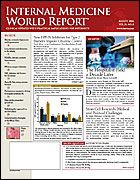Publication
Article
Internal Medicine World Report
High-Dose Corticosteroid use Tied to New-onset af
Author(s):
Arch Intern Med
Persons who are taking high-dose corticosteroids have more than a 6-fold higher risk of developing atrial fibrillation (AF), regardless of their reason for taking the steroids, according to the first large, population-based cohort study (. 2006;165: 1016-1020) that set out to determine whether the apparent connection suggested by case reports was more than coincidental.
This nested case-control study within the Rotterdam Study included almost 8000 adults aged ≥55 years. Investigators tabulated all new cases of AF occurring between July 1991 and January 2000 and found 385 incident AF cases that were eligible for inclusion.
Multivariate analysis that controlled for age and gender determined that patients who were prescribed a corticosteroid within 30 days of being diagnosed with AF were at a dramatically increased risk for AF. However, this increase was only significant in those using high doses of a corticosteroid (oral or parenteral daily dose ≥7.5 mg of prednisone equivalents). Those taking low or intermediate doses (<7.5 mg of prednisone equivalents or inhaled corticosteroids) were not at a substantially increased risk (Table).
Since virtually all the corticosteroid users who developed AF had at least 1 underlying cardiovascular (CV) risk factor, the authors conducted a further analysis that also controlled for myocardial infarction, heart failure, body mass index, user status, and the use of antihypertensive drugs in the month before being diagnosed with AF. As shown in the Table, the strength of the association persisted.
Previous researchers had suggested that it was the underlying asthma or other conditions such as chronic obstructive pulmonary disease (COPD), not the steroids used to treat these diseases, that were responsible for the new-onset AF. In contrast, this study showed that the risk of AF increased not only in patients with asthma or COPD but also in those taking corticosteroids for rheumatic, allergic, or malignant hematologic conditions.
These results help clear up a number of questions raised by previous researchers, including speculation by some that the increased risk of AF was a function of the long-term adverse CV effects of steroids (eg, hypertension, diabetes, obesity). “Our study,” write Cornelis S. van der Hooft, MD, Erasmus University Medical Center, Rotterdamn, the Netherlands, and colleagues, “found an increased risk for AF in recent new corticosteroid users as well as in persons who used corticosteroids before, supporting the hypothesis that corticosteroids have a potential direct arrhythmogenic effect.”
However, with a nod to the widespread prevalence of underlying CV disease risk factors, they add, “We think that high-dose corticosteroid therapy may act as a trigger rather than as a single cause for AF.”





